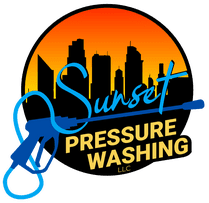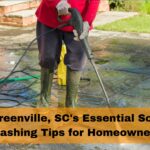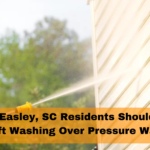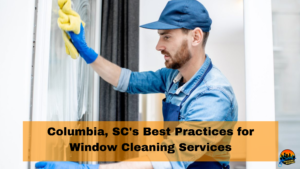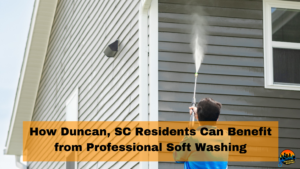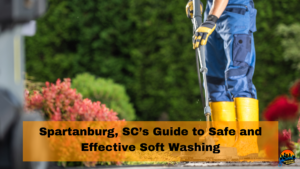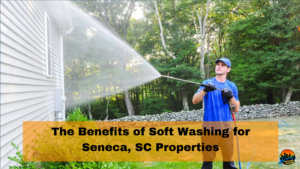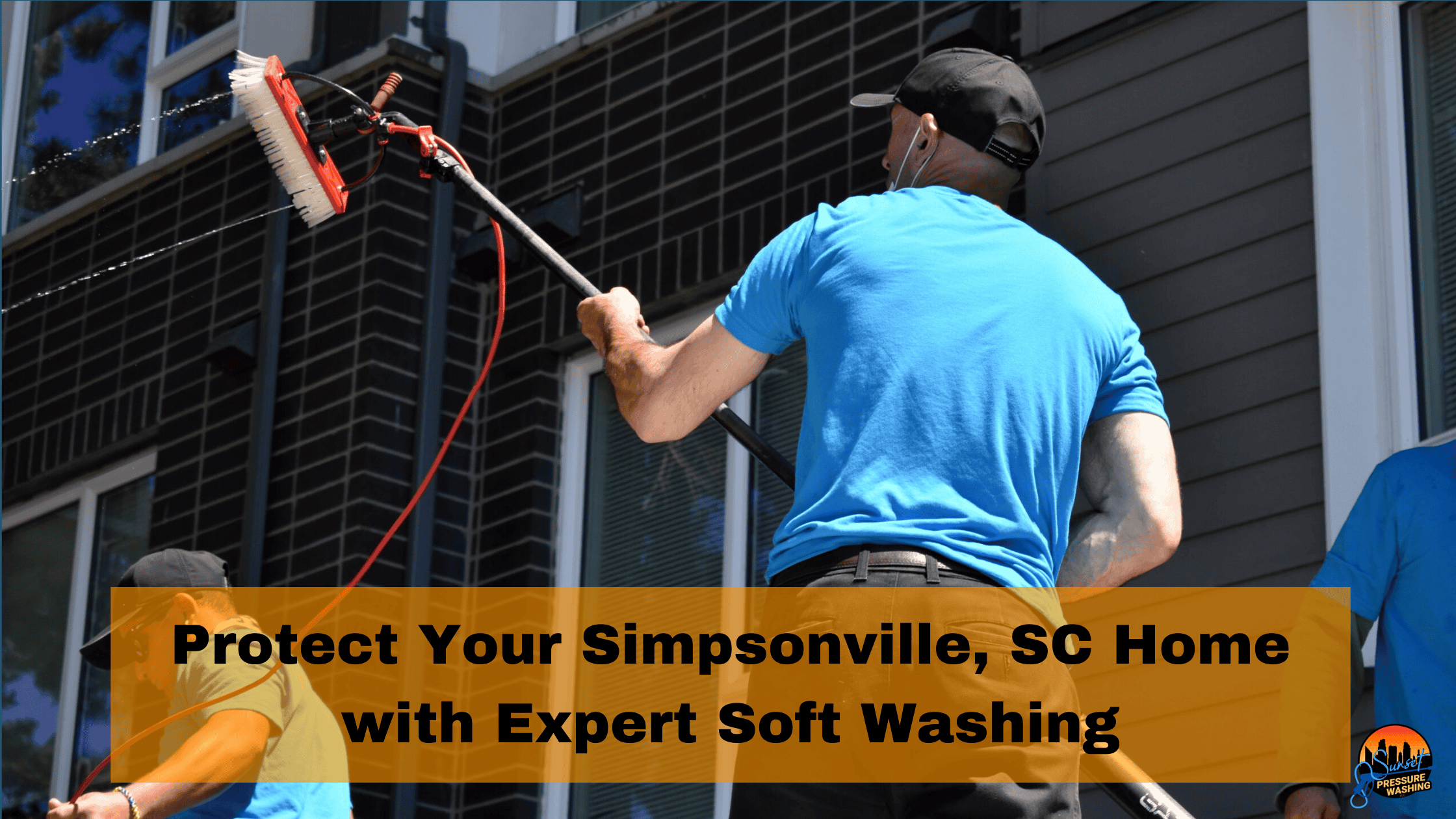
Simpsonville, SC, is known for its charming landscapes and beautiful homes. However, the local climate can take a toll on your home’s exterior, leading to the accumulation of dirt, mold, and mildew. This is where soft washing comes in as a gentle yet effective solution to maintain and protect your home’s beauty. In this blog, we’ll explore the benefits of expert soft washing and how it can extend the lifespan of your home’s exterior.
Understanding Soft Washing
Soft washing is a cleaning technique that uses low-pressure water jets combined with specialized cleaning solutions to effectively remove dirt, grime, mold, mildew, and other organic contaminants from exterior surfaces. Unlike traditional pressure washing, which relies on high-pressure water to blast away dirt, soft washing uses a gentler approach that minimizes the risk of damaging delicate surfaces like roof shingles, siding, and wood.
How Soft Washing Works
The process begins by applying a cleaning solution, which is specifically formulated to target and break down organic matter and stains. This solution often contains bleach or other biocides that kill mold, algae, and bacteria at their source. The solution is allowed to dwell on the surface for a period to ensure thorough saturation and effective microbial elimination.
After the solution has had time to work, a low-pressure rinse system is used to gently wash away the debris and cleaning agents. This system is significantly softer than traditional power washing and is akin to the pressure of a garden hose. This method ensures that even the most vulnerable surfaces are cleaned without the risk of erosion or degradation.
Advantages of Soft Washing
- Preserves Integrity of Building Materials: Soft washing is safe for use on a wide range of materials, including stucco, wood, vinyl siding, asphalt shingles, and more. It helps in preserving the integrity and longevity of building materials.
- Effective Sanitization: The biocidal components in the cleaning mix not only clean but sanitize the surfaces, offering a level of clean that goes beyond mere aesthetics.
- Long-Lasting Results: Because soft washing kills spores and other organic growth at the root, the results are long-lasting compared to high-pressure washing, which can sometimes merely displace these organisms without fully removing them.
- Eco-Friendly Options: Many soft washing solutions are eco-friendly, featuring biodegradable chemicals that do not harm the landscape or surrounding environment.
When to Use Soft Washing
Soft washing is particularly recommended for cleaning roof tiles, shingles, soffits, wood paneling, and other delicate surfaces where high pressure could cause damage. It is also the preferred method for removing organisms like mold, lichen, and algae, which can root deeply into surfaces and cause premature aging if not properly eradicated.
Benefits of Soft Washing Your Home
Soft washing is an innovative cleaning method that offers numerous advantages for homeowners, particularly in maintaining the aesthetic and structural integrity of their properties. This gentle yet effective technique can transform the exterior of your home, ensuring it not only looks welcoming but also stands up better against environmental challenges. Here are some of the key benefits of choosing soft washing for your home:
Thorough Cleaning and Sanitization
Soft washing goes beyond surface cleaning by using cleaning solutions that penetrate to remove and kill microscopic organisms such as mold, mildew, algae, and bacteria. This not only cleans the surface but also sanitizes it, creating a healthier environment around your home.
Protects Structural Integrity
The low-pressure nature of soft washing eliminates the risk of damage to your siding, roofing, and other delicate exterior features that might occur with high-pressure washing methods. By avoiding aggressive water pressure, soft washing ensures that materials like wood, stucco, and vinyl are not stripped, chipped, or dislodged.
Increases Longevity of Surfaces
By effectively removing harmful organic growths that can cause rot and decay, soft washing extends the life of your building materials. Regular soft washing can prevent the premature breakdown of your home’s exterior, potentially saving you significant money on repairs and replacements.
Enhances Curb Appeal
A clean home exterior not only feels inviting but also boosts curb appeal, which can be especially beneficial if you’re considering selling your property. Soft washing restores your home’s exterior to a like-new condition, highlighting its best features and making a strong first impression.
Eco-Friendly Cleaning
Many soft washing solutions are eco-friendly, designed to be safe for the environment. These solutions are typically biodegradable and non-toxic, ensuring that your landscaping, pets, and the local ecosystem are not harmed by harsh chemicals.
Prevents Damage From Organic Growth
Organic materials like moss, algae, and mold can cause substantial damage if left unchecked. Soft washing not only removes these growths but also prevents their quick return, protecting surfaces from moisture retention, staining, and decay.
Cost-Effective Maintenance
Regular maintenance through soft washing can be more cost-effective in the long run. By preventing the accumulation of dirt and organic debris, you reduce the need for more extensive repairs caused by these elements, thus managing your maintenance budget more effectively.
Safe for All Types of Exteriors
Whether your home features brick, wood, vinyl, or composite materials, soft washing can be safely used across a variety of surfaces. This versatility makes it a one-stop cleaning solution for the entire exterior of your home.
Availability and Local Suppliers
In Greenville, SC, many local suppliers and hardware stores carry a variety of soft washing solutions. Purchasing from local suppliers not only supports the community but also ensures that you have access to products suitable for the local climate and environmental conditions.
When to Choose Soft Washing Over Pressure Washing
Choosing the right cleaning method for your home’s exterior is crucial to both its appearance and longevity. While pressure washing is popular for its effectiveness in removing heavy soiling and debris, soft washing is often a better choice for many situations due to its gentle approach and deep cleaning capabilities. Here are several scenarios where soft washing is preferable over pressure washing:
Delicate Surfaces
Soft washing is ideal for cleaning more delicate surfaces that could be damaged by the high pressure of a pressure washer. These include roof shingles, soft wood, stucco, siding, and painted surfaces. The low pressure used in soft washing ensures that these materials are not stripped, chipped, or dislodged.
Presence of Organic Growth
For exteriors plagued by mold, mildew, algae, or moss, soft washing is particularly effective. The specialized cleaning solutions used in soft washing can kill these organic materials at their source, preventing them from quickly returning. Pressure washing, on the other hand, may only remove the surface layer, allowing the organism to regrow.
Long-Term Results Desired
Soft washing not only cleans but also offers longer-lasting results compared to pressure washing. Since the cleaning solution used in soft washing includes biocides, it prevents the regrowth of mold and algae for a longer period, thus maintaining the cleanliness and appearance of your home’s exterior over time.
Concerns Over Water Damage
Soft washing uses less water than pressure washing, which is particularly important in areas where water damage is a concern. It is the safer option for older homes or any structures where excessive water exposure could seep into material pores, causing damage or mold growth.
Environmental Considerations
If you are environmentally conscious, soft washing may be the better option because it often uses eco-friendly and biodegradable chemicals that minimize environmental impact. This method reduces the risk of harmful chemicals running off into your garden or water systems.
Areas Around Plants and Landscaping
Soft washing is less likely to cause damage to landscaping and plants around your home. The controlled use of chemicals and lower water pressure ensures that surrounding vegetation is not harmed by harsh runoff or high water pressure.
Preparing for Painting or Staining
If you are preparing your home’s exterior for painting or staining, soft washing is recommended to ensure that the surface is thoroughly clean and free from any residues that might interfere with the adhesion of paint or stain.
Comprehensive Surface Sanitization
For homeowners who want not just cleanliness but also sanitization, soft washing is the way to go. It removes and kills bacteria and viruses that might be present on surfaces, which is particularly important in times when hygiene is paramount.
Key Areas to Target with Soft Washing
Soft washing is an excellent maintenance strategy for various parts of a home’s exterior, particularly those prone to dirt accumulation and organic growth. When considering a soft washing treatment, certain areas of your home will benefit most from this gentle yet effective cleaning method. Here are key areas to target with soft washing:
Roofing
Roofs are highly susceptible to algae, moss, and lichen growth, especially in humid climates. These organisms can damage roofing materials over time, leading to costly repairs. Soft washing not only cleans the roof but also applies fungicidal and algaecidal agents that kill these growths and prevent their return, extending the life of your roof.
Siding
Whether your home has vinyl, wood, stucco, or fiber cement siding, each type can harbor mold and mildew, which degrade the material and detract from your home’s appearance. Soft washing your siding cleans and sanitizes these surfaces without the risk of damage from high-pressure water jets.
Gutters and Downspouts
Gutters can accumulate leaves, twigs, and other debris, which can lead to blockages and water damage. Soft washing removes these obstructions and clears out the growth of algae and mold, ensuring your drainage system functions properly.
Decks and Patios
Wooden decks and patios are prime candidates for soft washing due to their vulnerability to dirt, grime, and organic buildup. Soft washing can effectively clean these surfaces without the harsh impact of high pressure, preserving the wood and extending its lifespan.
Driveways and Walkways
Concrete, pavers, and other hard surfaces in driveways and walkways can develop stains from vehicles, mold, and mildew. Soft washing these areas not only cleans them thoroughly but also treats the surfaces with solutions that inhibit future growth.
Fences
Wooden or vinyl fences often show signs of weathering and organic contamination. Soft washing revitalizes the look of your fence and protects it from rotting, cracking, or discoloring due to organic infestations.
Outdoor Furniture
Outdoor furniture can also benefit from soft washing, particularly if it’s made from materials that are sensitive to damage from standard pressure washing techniques. This cleaning method helps remove dirt and prevent decay caused by moisture and organic debris.
Foundation Walls
The foundation walls of your home can accumulate moisture and foster the growth of harmful molds. Soft washing these areas helps to keep the foundation in good condition and prevents potential structural issues.
Garage Doors
Garage doors can gather a surprising amount of dirt and grime. A soft wash not only cleans but also preserves the paint and finishing, which can be damaged by more abrasive cleaning methods.
The Environmental Impact of Soft Washing
Soft washing is often touted for its effectiveness and gentleness on surfaces, but it’s also important to consider its environmental footprint. As homeowners become increasingly conscious of their environmental impact, understanding how soft washing aligns with eco-friendly practices can help in making informed decisions. Here’s a detailed look at the environmental implications of soft washing:
Chemical Use
One of the primary environmental concerns with soft washing is the type of chemicals used in the cleaning solutions. Traditional soft washing solutions may contain chemicals like sodium hypochlorite (bleach) which, while effective at killing mold, algae, and bacteria, can be harmful to the environment if not handled properly. However, many modern soft washing companies now use biodegradable, eco-friendly chemicals that break down quickly without leaving harmful residues, thus minimizing environmental impact.
Water Conservation
Soft washing uses significantly less water than traditional pressure washing. Since the method relies more on the cleaning agents than on the volume of water to clean surfaces, it is considered more water-efficient. This is particularly beneficial in areas where water conservation is a priority due to drought conditions or local regulations.
Runoff Management
Proper runoff management is critical in soft washing to prevent chemicals from entering storm drains and local waterways. Professional soft washing services typically take measures to contain runoff or neutralize the cleaning solutions before they can enter the ecosystem. This is crucial for protecting aquatic life and maintaining the quality of local water sources.
Air Quality
Because soft washing operates at lower pressures, it reduces the amount of aerosolized chemical mist that can be released into the air compared to high-pressure washing. This helps in minimizing air pollution and the inhalation of potentially toxic substances by wildlife and humans alike.
Longevity and Maintenance
Soft washing contributes to longer-lasting cleanliness on surfaces, which means fewer cleanings are necessary over time. This reduced frequency further diminishes the environmental impact, as less water and fewer chemicals are used throughout the lifespan of the property.
Impact on Surrounding Vegetation
The chemicals used in soft washing can potentially harm plants and grass if they are not carefully managed. Eco-friendly soft washing solutions, alongside techniques that protect vegetation (such as covering plants or diluting runoff), help mitigate any negative effects on your garden or green spaces.
Compliance with Environmental Regulations
Many regions have specific environmental guidelines regarding the use of chemicals and water for residential and commercial cleaning. Professional soft washing companies are typically aware of and comply with these regulations, ensuring that their practices are environmentally responsible.
Promotion of Healthier Environments
By effectively removing mold, algae, and bacteria, soft washing can reduce the presence of allergens and other unhealthy substances around homes. This not only improves air and surface quality but also promotes a healthier environment for local wildlife and the community.
DIY Soft Washing: Pros and Cons
Soft washing your home can be a rewarding DIY project that not only enhances the curb appeal but also extends the lifespan of your property’s exterior surfaces. However, before you decide to undertake soft washing on your own, it’s important to weigh the pros and cons to ensure it’s the right decision for you.
Pros of DIY Soft Washing
- Cost Savings: One of the most immediate benefits of DIY soft washing is the potential cost savings. Professional soft washing services can be expensive, and doing it yourself can reduce these costs significantly, especially if you already have some of the necessary equipment.
- Control Over Chemicals: When you handle the soft washing process yourself, you have complete control over the cleaning solutions used. This is particularly beneficial for those who prefer eco-friendly or less harsh chemicals, as you can choose products that are safe for your family, pets, and plants.
- Flexibility in Timing: DIY allows you to choose exactly when you want to do the cleaning based on your schedule and the specific needs of your home, such as immediate cleaning after a storm or when mold is noticed.
- Personal Satisfaction: There’s a certain level of satisfaction and accomplishment that comes from doing home maintenance tasks yourself. Completing a soft washing project can provide a sense of pride in improving and caring for your home.
Cons of DIY Soft Washing
- Potential for Damage: Without the proper knowledge and tools, there’s a higher risk of damaging your home. Incorrect use of cleaning solutions or water pressure can lead to damaged siding, stripped paint, or harmed vegetation.
- Safety Risks: Soft washing involves using chemicals that can be hazardous if not handled correctly. Additionally, the use of ladders and high-pressure equipment can pose significant safety risks if you’re not experienced.
- Time and Effort: Soft washing can be a time-consuming task, especially if you are new to the process. Properly cleaning your home’s exterior involves preparation, the actual cleaning, and then cleanup, which can take a significant amount of time.
- Inferior Results: Professionals have the experience and specialized equipment to achieve uniform cleanliness and appearance. DIY efforts might not reach the same level of cleanliness or could result in uneven cleaning.
- Recurring Costs: While initial costs might be lower, if you do not already own the necessary equipment (such as pressure washers, nozzles for low-pressure rinsing, and protective gear), the startup costs can add up. Additionally, incorrect methods can lead to more frequent cleanings or repairs, increasing long-term costs.
Choosing the Right Soft Washing Services in Simpsonville
Maintaining the pristine condition of your home’s exterior in Simpsonville, SC, requires choosing the right soft washing service. Soft washing is a delicate process that, if done correctly, can enhance your home’s aesthetic and protect it from various elements. Here’s how you can select the best soft washing service in Simpsonville.
Verify Credentials
Licensing and Insurance: Ensure that any soft washing company you consider is fully licensed to operate in your area. Licensing proves that the company adheres to local regulations and industry standards. Moreover, confirm that the company has adequate liability insurance and workers’ compensation. This is crucial as it protects you from any potential liabilities in case of accidents during the cleaning process.
Evaluate Experience and Reputation
Track Record and Customer Reviews: Experience is crucial in soft washing due to the nuanced nature of the job. A company with a long-standing presence in the industry is likely to deliver superior results. Additionally, read through customer reviews on trusted platforms like Google, Yelp, and BBB. Positive feedback and high ratings can be a good indicator of reliability and quality service.
Understand Cleaning Practices
Techniques and Materials: It’s important to understand what cleaning solutions the company uses and their approach to different surfaces. The best soft washing companies will use eco-friendly, biodegradable chemicals that are effective yet gentle on your home and the environment. They should also demonstrate a clear understanding of when to use soft washing over more abrasive methods like pressure washing.
Assess Professionalism and Customer Service
Communication and Service Details: A professional soft washing service should provide excellent customer service. This includes clear communication, transparency about the services offered, and prompt responses to inquiries. A detailed service agreement should outline the scope of work, pricing, and any guarantees or warranties offered, which can help prevent misunderstandings and ensure your expectations are met.
Compare Pricing and Value
Cost Considerations: Request detailed, written estimates from multiple service providers to compare costs. Be wary of quotes that seem unusually low as they may indicate lower quality services or hidden fees. Remember, the cheapest option is not always the best. Consider the overall value offered, including the quality of chemicals used, the thoroughness of the cleaning process, and the company’s reputation.
Check for Local Expertise
Knowledge of Local Conditions: A company that has extensive experience working in Simpsonville will be familiar with the specific challenges posed by the local climate, such as high humidity contributing to mold and mildew growth. Local expertise ensures that the company knows how to handle these issues effectively and can provide tailored advice for maintaining your home post-cleaning.
Request References and Proof of Work
Past Work and References: Ask for before-and-after photos of previous projects similar to yours. This can give you a clear idea of what to expect. Additionally, request references from past clients to get firsthand accounts of their experiences with the company. Reputable providers will be happy to share this information and stand by their work.
Revitalize Your Simpsonville Home: Expert Soft Washing Services to Protect and Enhance Your Property
Soft washing stands out as a crucial element in maintaining the integrity and beauty of your Simpsonville, SC home. With its gentle yet effective approach, expert soft washing not only enhances your property’s curb appeal but also protects it against harmful organisms like mold, algae, and mildew, which can degrade building materials over time. By choosing professional soft washing services, you ensure that your home is cleaned without risk of damage, preserving its appearance and value for years to come.
Don’t wait for the elements to wear down your home’s exterior. Take action now by visiting Sunset Pressure Washing to learn more about our expert soft washing services. Protect your investment and keep your home looking its best by scheduling a consultation with us today. Whether you’re dealing with stubborn stains or general upkeep, we’re here to help your Simpsonville home shine.
